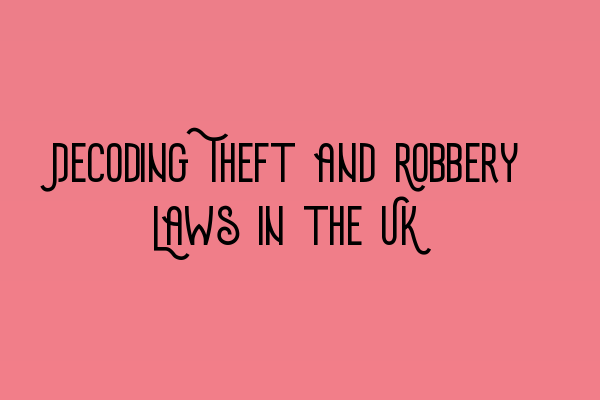Decoding Theft and Robbery Laws in the UK
Welcome to SQE Criminal Law & Practice Law UK! In this blog post, we will explore the intricate details of theft and robbery laws in the UK. Understanding these laws is crucial, whether you are studying for the SQE exams or need legal guidance in your professional or personal life.
Theft Laws in the UK
Theft is a serious offense in the UK, encompassing the act of dishonestly taking someone else’s property without their consent, with the intent to permanently deprive them of it. The legal definition of theft also includes the appropriation of property belonging to another, regardless of whether the intention is to keep it for oneself or on behalf of another party.
It is essential to note that theft laws apply not only to physical objects but also to intangible property, such as intellectual property or confidential information. In recent years, theft offenses have increasingly expanded to cover cyber-related crimes, reflecting the evolving nature of criminal activities.
To further understand the complexities of theft laws, you can explore our SQE 1 Practice Exam Questions or join our comprehensive SQE 2 Preparation Courses.
Robbery Laws in the UK
Robbery, on the other hand, is distinct from theft as it involves the elements of theft along with the use, or threat, of force against the person from whom the property is stolen. This crucial distinction elevates the offense to a more serious criminal offense, punishable by longer prison sentences.
Whether the use of force is actual or implied, it is the resulting fear imposed on the victim that distinguishes robbery from theft. The presence of violence or threats can significantly impact the punishment and implications for offenders.
If you are interested in testing your knowledge of robbery laws, we recommend our SQE 1 Practice Mocks FLK1 FLK2 which covers a range of legal scenarios.
Conclusion
Understanding the intricacies of theft and robbery laws in the UK is essential for legal professionals, aspiring solicitors, and anyone seeking legal advice. The SQE exams encompass these areas of law, making it crucial to study and comprehend these concepts thoroughly.
To stay up to date with the latest information on SQE exams and exam dates, we recommend visiting our page on SRA SQE Exam Dates.
Thank you for joining us at SQE Criminal Law & Practice Law UK. We hope you found this blog post informative and engaging. If you would like to delve deeper into theft and robbery laws or have any further legal queries, our team of legal experts is here to assist you.
